The Half-Earth Project® presented “Places and Voices of America the Beautiful: Cities and Biodiversity” featuring, Myriam Dondzina, Amy Rosenthal, Deja Perkins, and Robert McDonald on May 20th.
Cities and the concentrated development and habitation they entail can give rise to heat islands, food deserts, stark inequities, degraded habitat and other inhospitable dynamics for life. They can also, with cutting-edge planning and commitment to inclusivity and communities, nurture wild species, including against the impacts of climate change. The UN estimates that by 2030, cities will be home to 60% of Earth’s population. Meanwhile, they support surprising levels of biodiversity—research indicates as much as 20% of avian species may be captured by cities. As both centers of influence as well as impacts, cities matter for nature, and nature matters for cities.
Against the backdrop of the current push for 30×30, E.O. Wilson Biodiversity Foundation is convening ambassadors of conservation in American cities for a conversation on the opportunities and challenges in trying to help nature and people thrive together with equity and inclusion in these spaces. This talk moderated by Joel R. Johnson is the third in the series focused on areas of great biodiversity and the pathways and people essential to protecting them. We will start at the neighborhood level – how biodiversity data and citizen science, the zoom out to the city level to explore the work of the Chicago Wilderness, and then to a national scales in the Cities Network program of The Nature Conservancy, all informed by science, community-led, evidence-based approaches to biodiversity monitoring and conservation.
- Myriam Dondzina – Deputy Director, The Nature Conservancy Cities Network
- Deja Perkins – Geospatial Analytics PhD Student, Center for Geospatial Analytics, North Carolina State University
- Amy Rosenthal – Director of the Keller Science Action Center, Field Museum; steering committee member, Chicago Wilderness
- Robert McDonald – Lead Scientist for Nature-Based Solutions, The Nature Conservancy

